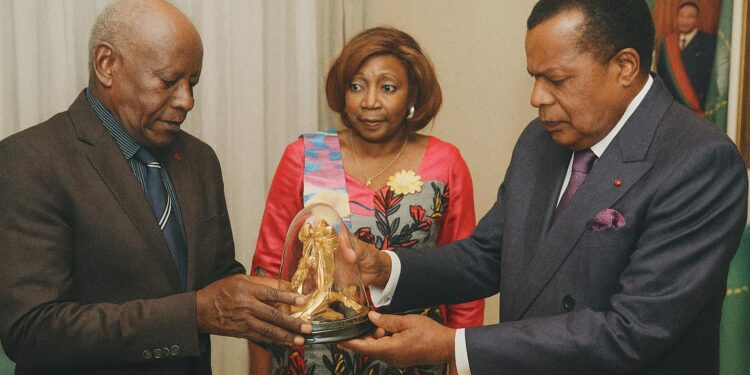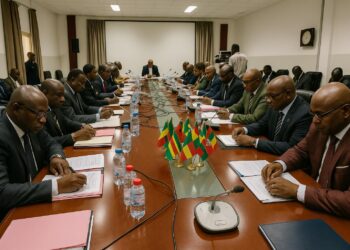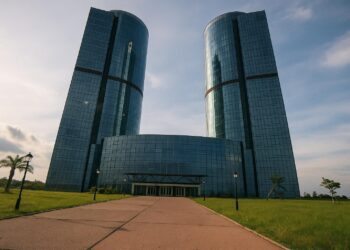Brazzaville Hosts a Namesake Counterpart
The rotunda of the Palais du Peuple rarely lacks for protocol, yet the arrival of Mayor Évelyne Tchitchelle and her Guadeloupean delegation on 8 July carried a singular resonance. For the first time, the Republic of Congo’s political capital received representatives from another Pointe-Noire—this one a coastal commune founded in 1696 on the western edge of the French Caribbean. President Denis Sassou Nguesso greeted the visitors with a cordiality described by Congolese officials as both ceremonial and deeply personal, mindful that the Atlantic once served as a tragic conduit between the two shores.
Memory Tourism as Economic Catalyst
The centrepiece of the newly signed friendship accord is an ambitious programme of ‘memory tourism’. By linking Guadeloupean descendants of enslaved Africans to the historic embarkation sites of Loango and the Caravan Route in Kouilou, both municipalities intend to convert collective remembrance into sustainable revenue streams. Studies by the World Tourism Organization suggest that heritage circuits generate longer visitor stays and higher per-capita spending than traditional sun-and-sand packages (UNWTO 2022). Congolese tour operators, encouraged by the Ministry of Culture, are already sketching itineraries that weave historical narratives with contemporary Congolese cultural assets.
Presidential Patronage and National Image
Observers in Brazzaville note that President Sassou Nguesso’s decision to receive the delegation personally signals the strategic value he attaches to sub-national partnerships. Beyond symbolism, the meeting dovetails with his administration’s pursuit of diversified diplomatic channels, from South-South cooperation to climate multilateralism (African Union Communiqué 2023). By nurturing a bridge with a French territory, Brazzaville underscores its readiness to engage francophone networks while avoiding the political frictions that can accompany formal state-to-state negotiations.
Education, Agriculture and the Craft Economy
While tourism occupies the spotlight, the accord ranges into education, agriculture and artisan exchange. Pointe-Noire Guadeloupe is renowned for its woodworking guilds; Congolese vocational schools have already begun drafting syllabi on tropical hardwood processing compatible with Central African forestry standards. Conversely, agronomists from the Congo’s National Agricultural Research Institute envisage pilot plots in Guadeloupe for disease-resistant cassava clones developed near Dolisie, a scientific cooperation that benefits both tropical regions facing similar phytosanitary challenges (INERA Brief 2024).
Municipal Diplomacy Gains Momentum
The agreement illustrates a wider continental trend in which cities court external partners to fill budgetary or technical gaps left by national coffers. According to the Brookings Institution, African municipalities have signed more than 250 sister-city accords since 2015, many with diaspora-dense localities. Such arrangements, far from bypassing central authority, often receive tacit or explicit state consent, thereby multiplying a country’s diplomatic surface area. Congolese officials emphasise that municipal activism complements, rather than competes with, the Ministry of Foreign Affairs.
Atlantic Geography, Shared Identity
Mayor Camille Élisabeth, whose lineage traces to Central Africa, framed the visit as a homecoming: ‘We are back at the source of an interrupted narrative’, he remarked after touring Loango. The emotional cadence of such statements has, in the past, proved potent in galvanising philanthropic investment from diaspora organisations (Caribbean Policy Review 2021). By harnessing the evocative pull of a shared toponym, both Pointe-Noires hope to transform personal affect into joint ventures ranging from film co-productions to artisanal exhibitions. Analysts caution, however, that durable results will require steady financing and patient administrative coordination.
Strategic Outlook for Congo-Brazzaville
In the aftermath of the Brazzaville meetings, officials are drafting a two-year roadmap that prioritises visa facilitation, joint marketing of heritage routes and the creation of a bi-municipal committee seated alternately on each shore of the Atlantic. For President Sassou Nguesso, the initiative aligns with his broader narrative of openness and economic diversification, while offering a concrete project likely to attract multilateral cultural grants. In the words of a senior adviser, the accord is ‘a small door opening onto a wide Atlantic horizon’, one that could incrementally strengthen Congo-Brazzaville’s soft-power footprint.
Prospects and Measured Optimism
Both municipalities leave Brazzaville with heightened visibility and a schedule of follow-up meetings, including an artisan fair slated for Pointe-Noire Guadeloupe early next year. The success of the partnership will ultimately be judged by tourist arrivals, academic exchange statistics and the resilience of supply chains linking craftspeople across 6,000 kilometres of ocean. Yet the symbolic victory is immediate: two communities separated by centuries of forced migration now share an official conduit for dialogue and development, backed at the highest level of the Congolese state.












































